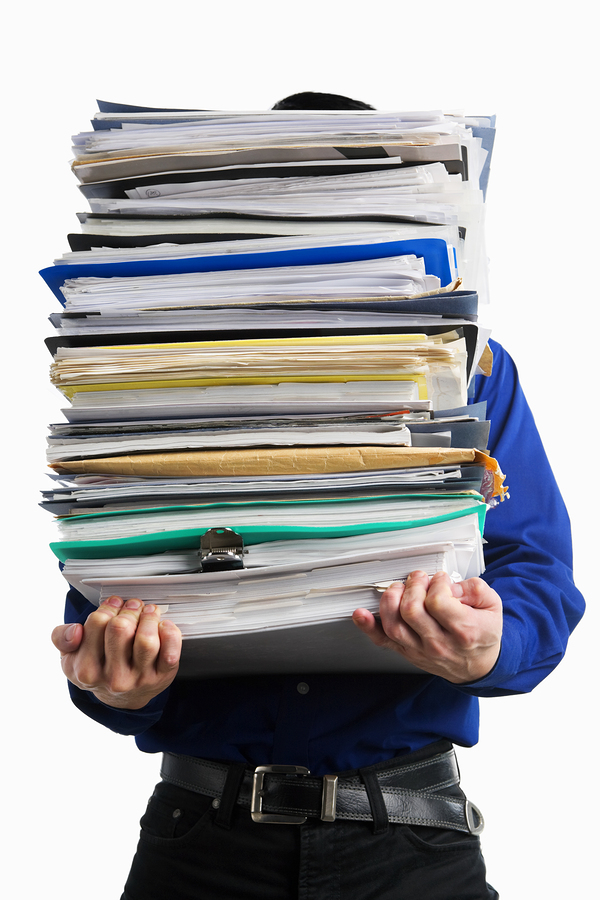Now that Tax Day has come and gone, it’s a good idea to take a look at the ever-increasing stack of paper that inevitably invades and builds up in your home office and file cabinets.
Spring is a great time to toss what you don’t need. However, before you get carried away and become a paper minimalist by tossing out all of it, let’s take a look at what you need to keep. Depending on what type of documents you’re dealing with, you need to store some of them for certain periods of time, others you can digitize, and others you can throw away or shred. Be sure to invest in a good cross-cut shredder to guard against identity theft.
Let’s start with the documents you need to keep physical copies of forever:
- Birth certificates, death certificates, marriage licenses, divorce decree
- Social Security cards, ID cards, passports
- Pension plan documents
- Most recent estate planning documents: wills, trusts, health care directives, powers of attorney, etc.
- House deeds and mortgage documents including records of paid off mortgages.
- Medical records for major illnesses, vaccinations, reactions to medications and any other important medical information.
- Business licenses
- Any insurance policy – keep a paper copy even if you have a digital copy
- Vehicle titles and loan documents
- Military Discharge form DD 214
- For CCMI clients, your Personal Financial Affairs Record that you completed in conjunction with your financial plan.
Here are some additional that may be kept in a safe place until it is no longer needed.
| Type of record | Length of time to keep, and why: |
| Taxes and supporting documentation | Seven Years – This includes any supporting documentation for deductions taken such as charitable contributions, mortgage interest, retirement plan contributions, Health Savings Account contributions. |
| Medical Receipts | Seven Years – if you are keeping track for your Health Savings Account (HSA) for tax purposes.
See above for medical documents to keep permanently. |
| Pay Stubs | One Year – once you receive your annual W2 and the information matches. If it doesn’t match, request a corrected W2 from your employer(s). |
| Investment Statements | One year – keep monthly or quarterly statements until you receive the annual summary to ensure it matches.
And/Or Seven years – keep annual statements with your tax records, especially if you had capital transactions. And/Or Until a security is sold – for information showing the initial purchase price for stocks and mutual funds so you know your cost basis. Cost basis will determine whether you have a capital gain or loss. |
| Retirement account contributions | Seven years – for records of contributions, especially if they are made to a nondeductible account. This will be tracked on form 8606 on your tax return. |
| Credit Card Receipts | One Month – until you get your monthly statement.
Or Seven Years if tax-related expenses are documented. |
| Utility Bills | One year – unless you are using these as a deduction (e.g. home office) than keep with your tax records. |
| Bank Statements | One year – Unless needed for tax purposes, then three years. |
| Sales receipts | For large purchases, for the life of the product. |
| Warranties and instructions | Keep for the life of the product. |
| Loan Documents | Keep until the loan is paid off. |
In regard to taxes, the IRS has 3 years from your filing date to audit your return if it suspects good-faith errors and 6 years to challenge your return if it thinks you underreported gross income. There is no time limit if you failed to file your return or filed a fraudulent return. In general, you want to keep physical copies of anything related to state or federal matters, including certifications, licenses, or deeds. The reason is twofold: you want to have easy access to these in case you need them, and they’re also difficult to replace because you typically need to make a direct request to the government agency, which takes a lot of time.
If you’re unsure what to do with these important documents, consider keeping an “emergency kit” so you always know where they are. You may also store your important documents in a secure location such as a fireproof safe or better yet, an offsite safety deposit box. For CCMI clients, an even better option is to upload the scanned versions of the documents listed above to their personal secure online vault via ShareFile.
Clients who have gone through the keep/toss/shred process with documents report that it’s better than a diet. One client reported, “I feel like I’ve lost 15 pounds, now that I am not digging through forms and paper and moving stacks around in my home!”
(Adapted from information originally found on bankrate.com)
CCMI provides personalized fee-only financial planning and investment management services to business owners, professionals, individuals and families in San Diego and throughout the country. CCMI has a team of CERTIFIED FINANCIAL PLANNERTM professionals who act as fiduciaries, which means our clients’ interests always come first.
How can we help you?





